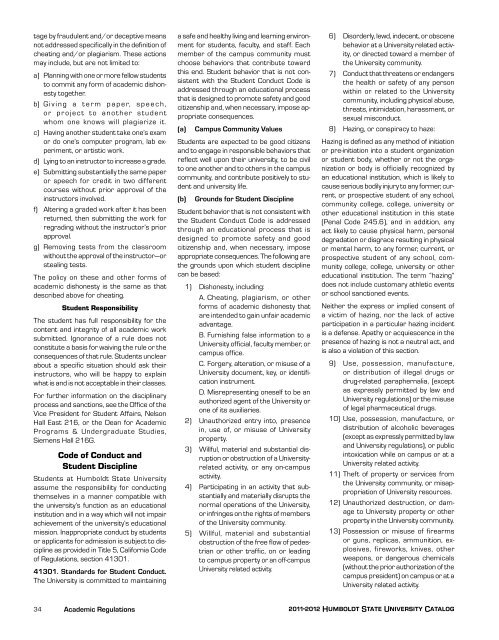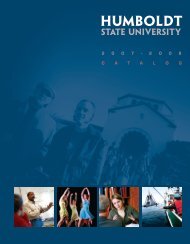2011-12 Academic Year - Bad Request - Humboldt State University
2011-12 Academic Year - Bad Request - Humboldt State University
2011-12 Academic Year - Bad Request - Humboldt State University
Create successful ePaper yourself
Turn your PDF publications into a flip-book with our unique Google optimized e-Paper software.
tage by fraudulent and/or deceptive means<br />
not addressed specifically in the definition of<br />
cheating and/or plagiarism. These actions<br />
may include, but are not limited to:<br />
a) Planning with one or more fellow students<br />
to commit any form of academic dishonesty<br />
together.<br />
b) Giving a term paper, speech,<br />
or project to an other student<br />
whom one knows will plagiarize it.<br />
c) Having another student take one’s exam<br />
or do one’s computer program, lab experiment,<br />
or artistic work.<br />
d) Lying to an instructor to increase a grade.<br />
e) Submitting substantially the same paper<br />
or speech for credit in two different<br />
courses without prior approval of the<br />
instructors involved.<br />
f) Altering a graded work after it has been<br />
returned, then submitting the work for<br />
regrading without the instructor’s prior<br />
approval.<br />
g) Removing tests from the classroom<br />
without the approval of the instructor—or<br />
stealing tests.<br />
The policy on these and other forms of<br />
academic dishonesty is the same as that<br />
described above for cheating.<br />
Student Responsibility<br />
The student has full responsibility for the<br />
content and integrity of all academic work<br />
submitted. Ig norance of a rule does not<br />
constitute a basis for waiving the rule or the<br />
consequences of that rule. Students unclear<br />
about a specific situation should ask their<br />
instructors, who will be happy to explain<br />
what is and is not acceptable in their classes.<br />
For further information on the disciplinary<br />
proc ess and sanctions, see the Office of the<br />
Vice President for Student Affairs, Nelson<br />
Hall East 216, or the Dean for <strong>Academic</strong><br />
Programs & Undergraduate Studies,<br />
Siemens Hall 216G.<br />
Code of Conduct and<br />
Student Discipline<br />
Students at <strong>Humboldt</strong> <strong>State</strong> <strong>University</strong><br />
assume the responsibility for conducting<br />
themselves in a manner compatible with<br />
the university’s function as an educational<br />
institution and in a way which will not impair<br />
achievement of the university’s educational<br />
mission. Inappropriate conduct by students<br />
or applicants for admission is subject to discipline<br />
as provided in Title 5, California Code<br />
of Regulations, section 41301.<br />
41301. Standards for Student Conduct.<br />
The <strong>University</strong> is committed to maintaining<br />
a safe and healthy living and learning environment<br />
for students, faculty, and staff. Each<br />
member of the campus community must<br />
choose behaviors that contribute toward<br />
this end. Student behavior that is not consistent<br />
with the Student Conduct Code is<br />
addressed through an educational process<br />
that is designed to promote safety and good<br />
citizenship and, when necessary, impose appropriate<br />
consequences.<br />
(a) Campus Community Values<br />
Students are expected to be good citizens<br />
and to engage in responsible behaviors that<br />
reflect well upon their university, to be civil<br />
to one another and to others in the campus<br />
community, and contribute positively to student<br />
and university life.<br />
(b) Grounds for Student Discipline<br />
Student behavior that is not consistent with<br />
the Student Conduct Code is addressed<br />
through an educational process that is<br />
designed to promote safety and good<br />
citizenship and, when necessary, impose<br />
appropriate consequences. The following are<br />
the grounds upon which student discipline<br />
can be based:<br />
1) Dishonesty, including:<br />
A. Cheating, plagiarism, or other<br />
forms of academic dishonesty that<br />
are intended to gain unfair academic<br />
advantage.<br />
B. Furnishing false information to a<br />
<strong>University</strong> official, faculty member, or<br />
campus office.<br />
C. Forgery, alteration, or misuse of a<br />
<strong>University</strong> document, key, or identification<br />
instrument.<br />
D. Misrepresenting oneself to be an<br />
authorized agent of the <strong>University</strong> or<br />
one of its auxiliaries.<br />
2) Unauthorized entry into, presence<br />
in, use of, or misuse of <strong>University</strong><br />
property.<br />
3) Willful, material and substantial disruption<br />
or obstruction of a <strong>University</strong>related<br />
activity, or any on-campus<br />
activity.<br />
4) Participating in an activity that substantially<br />
and materially disrupts the<br />
normal operations of the <strong>University</strong>,<br />
or infringes on the rights of members<br />
of the <strong>University</strong> community.<br />
5) Willful, material and substantial<br />
obstruction of the free flow of pedestrian<br />
or other traffic, on or leading<br />
to campus property or an off-campus<br />
<strong>University</strong> related activity.<br />
6) Disorderly, lewd, indecent, or obscene<br />
behavior at a <strong>University</strong> related activity,<br />
or directed toward a member of<br />
the <strong>University</strong> community.<br />
7) Conduct that threatens or endangers<br />
the health or safety of any person<br />
within or related to the <strong>University</strong><br />
community, including physical abuse,<br />
threats, intimidation, harassment, or<br />
sexual misconduct.<br />
8) Hazing, or conspiracy to haze:<br />
Hazing is defined as any method of initiation<br />
or pre-initiation into a student organization<br />
or student body, whether or not the organization<br />
or body is officially recognized by<br />
an educational institution, which is likely to<br />
cause serious bodily injury to any former, current,<br />
or prospective student of any school,<br />
community college, college, university or<br />
other educational institution in this state<br />
(Penal Code 245.6), and in addition, any<br />
act likely to cause physical harm, personal<br />
degradation or disgrace resulting in physical<br />
or mental harm, to any former, current, or<br />
prospective student of any school, community<br />
college, college, university or other<br />
educational institution. The term “hazing”<br />
does not include customary athletic events<br />
or school sanctioned events.<br />
Neither the express or implied consent of<br />
a victim of hazing, nor the lack of active<br />
participation in a particular hazing incident<br />
is a defense. Apathy or acquiescence in the<br />
presence of hazing is not a neutral act, and<br />
is also a violation of this section.<br />
9) Use, possession, manufacture,<br />
or distribution of illegal drugs or<br />
drug-related paraphernalia, (except<br />
as expressly permitted by law and<br />
<strong>University</strong> regulations) or the misuse<br />
of legal pharmaceutical drugs.<br />
10) Use, possession, manufacture, or<br />
distribution of alcoholic beverages<br />
(except as expressly permitted by law<br />
and <strong>University</strong> regulations), or public<br />
intoxication while on campus or at a<br />
<strong>University</strong> related activity.<br />
11) Theft of property or services from<br />
the <strong>University</strong> community, or misappropriation<br />
of <strong>University</strong> resources.<br />
<strong>12</strong>) Unauthorized destruction, or damage<br />
to <strong>University</strong> property or other<br />
property in the <strong>University</strong> community.<br />
13) Possession or misuse of firearms<br />
or guns, replicas, ammunition, explosives,<br />
fireworks, knives, other<br />
weapons, or dangerous chemicals<br />
(without the prior authorization of the<br />
campus president) on campus or at a<br />
<strong>University</strong> related activity.<br />
34 <strong>Academic</strong> Regulations<br />
<strong>2011</strong>-20<strong>12</strong> <strong>Humboldt</strong> <strong>State</strong> <strong>University</strong> Catalog

















